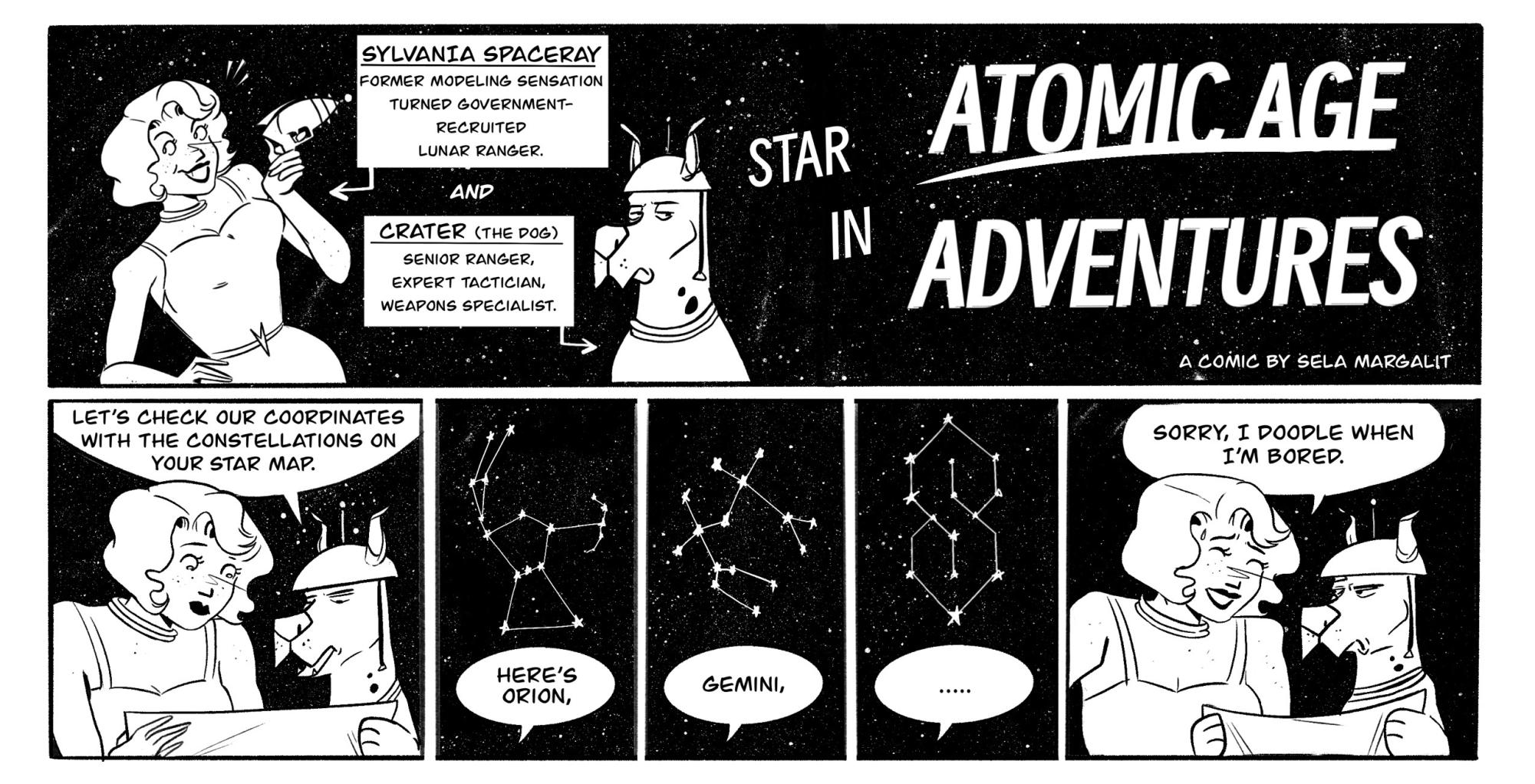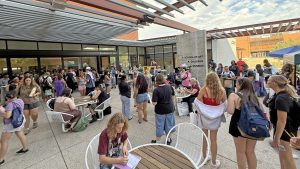
Alumna Machado honors roots with audiorama hemp project
By Michael Chesnick. November 7, 2024Tucked in the back of Arizona Arts Live’s soothing audiorama installation near Centennial Hall is a small replica of El Tiradito, a popular wishing shrine in downtown Tucson.
For landscape designer and School of Art alumna Micaela Machado, helping create the sculpture out of hemp blocks and the surrounding garden was a chance to celebrate her Mexican-American roots.

“El Tiradito is special to my family, so it was a real honor to recreate it with love,” said Machado, who grew up in Nogales, Arizona, before moving to Tucson and attending Salpointe Catholic High School. “In all my designs, art and landscape, I try to honor the past and protect the future.”
Her past has been pretty special, too. After receiving a BA in studio art with a minor in business in 2007 from the University of Arizona, she landed a cool job as a local artistic fabricator and went back to earn her master’s in landscape architecture from the U of A. That led to Machado starting her own natural building company, Old Pueblo Hemp, which specializes in hemp-lime construction.
Visitors can see the El Tiradito replica inside the “Cuk Ṣon Audiorama” until Dec. 10. The open-air auditorium, just east of Centennial Hall, lets students and others rest in the company of nature and music. Cuk Ṣon is derived from the Tohono O’odham name for Tucson, referring to the 17th-century O’odham village “at the base of the black hill,” now “A” Mountain.
The School of Art recently spoke with Machado about the installation and her career:
Q. How did you get involved with the Audiorama project?
A. I was invited to collaborate on this project by my good friend and design buddy Carlos Arzate of Arzate Design Group. El Tiradito was Carlos’ idea, and when he suggested that we do it out of hemp, I jumped at the chance. We worked out the concept together, and I helped him source the plants, but it is his design. On install day, I was there for the hemp build and to unload and place plants while Carlos and the crew placed boulders. I used to work for Arzate Design Group, so we used to do installs together all the time. Carlos has been ultra-supportive of my choice to pursue contracting and starting my company, and he was happy to give me the opportunity to highlight hemp building in an artistic way.

Q. How did you get to know Carlos?
A. We met through a networking event. And not two weeks later, we were cast together on a TV pilot show in London. It was a landscape design competition show, and Carlos and I recreated an Aztec Pyramid in the middle of the English Countryside. Our tagline was: “We’re bringing the Raza to your English Casa!” It was a bonding experience, and we’ve been family friends and design partners ever since.
Putting this garden together again with Carlos has been a trip down memory lane. We even tagged our old TV producers to show them we are still at it. So, it’s pretty awesome that we are still “Bringing the Raza to your Casa” with this project. From Aztec pyramids in London to El Tiradito at Centennial Hall, we love to highlight our heritage.
Q. How did your childhood impact you as an artist and landscape designer?
A. Growing up on the Arizona-Mexico border and all its mixed culture has influenced my life completely. I am of both cultures. Mexican and American. I speak Spanish and English. “Soy del rancho,” but at the same time I’m super Americanized. It used to feel divided and like I’m not enough of either, but now it feels like a gift I’ve been given. I can connect and communicate with both cultures. I get to be a part if both worlds. I’m not divided. I’m the whole enchilada.
Q. How did your School of Art degree and business minor prepare you for your career?

A. Following my mother’s footsteps, I’ve always been very artistic, and thanks to her I was always very supported in pursuing art into a career. My father the lawyer, on the other hand, was a bit more realistic about my choice. He said that the only way that he would pay for me to go to art school was to get a minor in business, so I could be prepped for the real world, too. At the time I thought he was being dramatic, but in hindsight it really was very valuable advice.
My art degree and business minor really helped me figure out a plan on how to make money while making art — without having to sell my art to a gallery. Through the recommendation of my sculptor instructor, I got a fantastic job as an artistic fabricator for a (Tucson) company called Cemrock, and it really changed my life. I was totally happy traveling, making great money carving, sculpting and painting rockwork all over the country when the Great Recession hit, and we all lost our jobs.
Q. Is that what led you to pursue your master’s in landscape architecture?
A. I was devastated and realized that my position wasn’t as stable as I would want it to be. And by pure silly coincidence, I learned about the College of Architecture, Planning and Landscape Architecture or CAPLA, and I was super intrigued. I was already manipulating landscapes and creating habitats through my rockwork, and I felt like this was the perfect next step for me. With my art degree, my business minor and my work experience with Cemrock, I felt my portfolio was strong and I was accepted into CAPLA.
Through CAPLA, I learned about a new passion of mine which is sustainable design. I thought I’d be designing golf courses and theme parks, but I learned what a great opportunity and the important responsibility we have as designers to make better choices for our planet and our future generations. Especially here in the desert. It’s so important that we are designing to be in sync with nature. Things that excite me now are native plantings, water harvesting, solar power, food self-reliance, wildlife habitats, natural building materials.
Q. What attracted you to hemp construction, and what are the advantages of the material?

A. I was super happy being a sustainable landscape designer, but my life was disrupted when I learned about hemp. I’ve always been a cannabis advocate — the only plant that can house, clothe and feed you — and when I learned that you could build healthy homes from it, my mind was blown away. Currently, our traditionally built homes are not energy efficient, leach thousands of toxic chemicals and don’t last long enough. But there are so many benefits to building with hemp blocks. They are all natural, can save up to 70 percent in heating-cooling bills and are fire-, mold- and pest-resistant. They are sustainable — you can grow your own building materials — sequester carbon, last for thousands of years and are biodegradable. The price is also comparable to current building methods.
I had to get my hands on hemp, and when I did, it was a clear message from the universe that I should be building healthy hemp homes. So now I’m a licensed, bonded and insured general contractor that specializes in industrial hemp builds.
Q. How do you build with hemp?

A. There are several ways, but I specialize in “block making.” It’s a simple formula of hemp hurd, plus lime binder, plus water compressed into a building block that will last thousands of years. I’m blessed to have this information passed on to me, and now it’s my job to build healthy homes for our future. Hemp building is the way, and I’m excited that Tucson is onboard. It’s funny how this Audiorama project is the culmination of my career and life path. I just built a sculpture out of my own hemp blocks in a beautiful garden at the U of A. What a trip!
Q. Do you have any advice or tips for students at the School of Art?
A. Wear many hats. Art can lead you in many different directions, and it’s such a strong background that it can apply to many careers. Try the different hats out and see what makes you feel best. My career now is not what I thought it would be, but I let my life experiences and passions lead me. Gotta find those jobs that feed your creative side — while still paying the bills.







